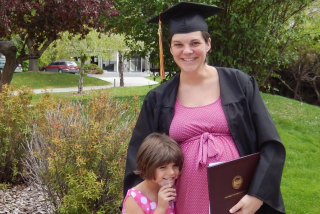Fawcett Gives Dimension to Plight of ‘Little Rich Girl’
- Share via
If unhappiness is tragic, Barbara Hutton was very tragic.
The anguished heiress, ably played by Farrah Fawcett in “Poor Little Rich Girl,” is weak and neurotic, an epic victim whose profound insecurity and self-hatred makes her vulnerable to the many predators who pass through her life on a turnstile.
Fawcett is building her reputation as a serious actress by playing abused women, from the battered wife in TV’s “The Burning Bed” to the counter-attacking assault victim in the stage and movie versions of “Extremities.” Now comes a third: the heir to the Woolworth fortune, who was one of the wealthiest--and unhappiest--women of her time.
In this NBC miniseries (9 tonight and 8 p.m. Tuesday on channels 4, 36 and 39), Fawcett manages finally to infuse a dark, nervous energy into a brittle, essentially one-dimensional character. Initially flat and tenuous, Fawcett seems to grow in her role as Hutton herself becomes increasingly desperate and wastes away.
Written by Dennis Turner and directed by Charles Jarrott, “Poor Little Rich Girl” is stunningly beautiful, but ultimately as empty as Hutton and the other one-note characters it portrays.
It’s a very watchable five hours, though, in part because of Fawcett and an excellent supporting cast that includes such Britons as Zoe Wanamaker and Carmen Du Sautoy, who rarely appear on American TV.
From the perspective of an envious viewer, moreover, there is something very satisfying about seeing the fabulously wealthy--from Barbara Hutton to the fictional Carringtons of “Dynasty”--stew in their own juices. No wonder the miserable rich are usually good box office.
The authenticity of “Poor Little Rich Girl” is yet another question, as it is with every docudrama. It is “based on” C. David Heymann’s 1983 book of the same title, according to NBC publicity and the credits listed on the miniseries. But Heymann’s original hard-cover version of “Poor Little Rich Girl” was discredited on several points and was recalled by the publisher. A revised version was later released by another company. However, NBC and the producers say that everything in the miniseries was independently verified.
“Poor Little Rich Girl” opens with the 1917 suicide of 5-year-old Barbara’s mother. Unwanted by her philandering father, Franklyn Hutton (Kevin McCarthy), she is shunted from household to household. Seven years later, she inherits $28 million from the estate of her grandfather, F. W. Woolworth (Burl Ives).
She leads an insular life from the start, always unsure if she’s being desired for herself or her money. Playmates are imported for her like playthings, and there is one particularly touching scene in which she tries to buy the affection of her girlfriends by lavishing them with gifts. Her only true friend is her cousin, Jimmy Donahue (Bruce Davison), who pops in and out of her life as a sort of bemused observer.
Decadent nobility--earls, counts and princes--pass through this cynical story like faceless zombies, all ready to exploit the weaknesses of beautiful and glamorous Barbara. As if following a script, she is ready to be exploited, primed for it as if being a victim were her life’s calling.
The suitors blur, and she will marry seven times before her death in 1978 at age 66, having spent millions on all of her spouses except one, Cary Grant (James Read). “I always look after my husbands,” she says, ruefully.
We meet her first two husbands tonight, the playboy Prince Alexis Mdivani (Nicholas Clay) and the tyrannical and sadistic Count Court Reventlow (Amadeus August), who will father her only child, the ill-fated Lance (Linden Ashby).
At one point, Barbara yearns to discover her true self. “I want to lock the door and pull the shades . . . and see who’s really there,” she says.
The problem is that there isn’t anyone there. Except for her spending sprees and extravagant life style, the Barbara Hutton depicted here is a rather uninteresting subject, a bejeweled, dazzlingly gowned socialite who has no center of gravity. Although there is mention of a few good deeds she did with her money, she is largely without substance--a boozing, pill-popping, bed-hopping, vacuously unsympathetic wretch who squanders her life and her fortune. People either abandon her or she abandons them, until finally she is alone, the dissipation finally complete.
“You gave me a couple of my years back,” she wearily tells one of her boyfriends as she dismisses him. “I’ll remember those.”
More to Read
The complete guide to home viewing
Get Screen Gab for everything about the TV shows and streaming movies everyone’s talking about.
You may occasionally receive promotional content from the Los Angeles Times.






